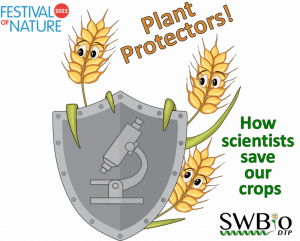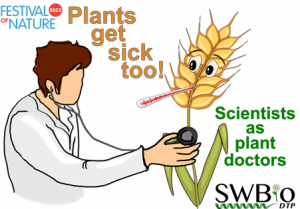A team of our SWBio DTP PhD students will be attending the Festival of Nature and running a stall titled ‘Pests, Plants and Parasites: How researchers in the Southwest are protecting your food’. To promote this event, some of the team have written some student blogs.
 Plant protectors – How Scientists save our crops
Plant protectors – How Scientists save our crops
As obvious as it sounds, plants can’t move. This means that when times get tough plants just have to stick it out and defend themselves as best as they can. Droughts, floods, and frosts can destroy plants. Weeds can steal light and nutrients. Insects and other pests eat away at leaves and stalks. Fungi, bacteria, and viruses can attack the plant and cause disease. These losses can have big economic effects, for example, last year floods and droughts cost the agricultural sector $21 billion and $37 billion respectively.
However, plants aren’t helpless, and many have their own defences. Thorns on roses and stingers on nettles can put off an animal trying to eat these plants. Scientists have even found evidence that plants actually know when they’re being injured or eaten and can send distress signals to other leaves around the plant. This is despite plants not actually having a nervous system like we do!
Even with their own defences, we want to protect plants from damage and loss because we need plants for clothes, medicine, fuel etc. What can we do to protect our plants?
Learn more about how scientists work as plant protectors to save our crops >>
 Plants get sick too – Scientists as Plant doctors
Plants get sick too – Scientists as Plant doctors
Every day we rely on plants to survive. They provide us with clothing, food, medicines, fuel and even the oxygen we breath. But have you ever thought about how plants get sick?
Plants can be attacked by all sorts of pathogens (a term for any organism that causes disease). These range from microscopic worms and fuzzy fungi to invisible monsters like bacteria and viruses that you can’t see with the naked eye.
Just like how sickness can keep humans out of work, the damage done to plants by any of the above pathogens can stop them from producing all things we need them for. Around 40% of our food today is lost due to damage by insect pests and plant pathogens.
Learn more on how plants get sick just like us and how scientists have to act as plant doctors >>
